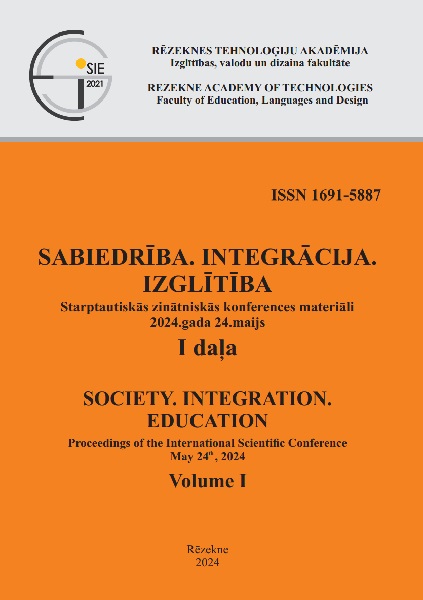TEACHERS’ MOTIVATIONS, BELIEFS, AND EXPECTATIONS REGARDING MORAL EDUCATION IN UPPER SECONDARY EDUCATION
DOI:
https://doi.org/10.17770/sie2024vol1.7904Keywords:
program assessment, upper secondary education, teachers’ motivation, virtue educationAbstract
This study explored high school teachers’ motivations and preferences regarding adolescents’ moral education in the context of the assessment of the newly developed program ‘e-TAP+’ for virtue education in Grades 10 to 12 in Latvia. The program comprises four modules: personal flourishing, flourishing relationships, societal flourishing, and digital flourishing. The research questions guiding the research were: Which aspects of moral education at high school were most important for teachers, as evidenced by the topics they chose to pilot in their classes? What were teachers' motivations for and expectations of participating in the evaluation of the virtue education program? This mixed-method survey research used an online questionnaire completed by 107 secondary school teachers from all regions of Latvia. In December 2023 – January 2024 teachers volunteered to participate in the piloting of the program, chose their preferred topics, and provided open-ended feedback on their choices and motivations. A total of 225 topics were chosen (90 in Grade 10, 81 in Grade 11, and 54 in Grade 12). Preliminary findings suggest that participants’ overall opinion about the program was very positive. Teachers’ main motivations were (1) the availability of quality materials for classroom discussion about virtues and values, and (2) the topicality of the program’s themes. Teachers in Grade 10 prioritized topics related with flourishing relationships (n=29, 32%), teachers in Grade 11 had a slightly bigger interest in personality than in relationships (n=28, 34% and n=24, 30%, respectively), and teachers in Grade 12 prioritized personality flourishing (n=20, 37%). The results will be valuable for other high school teachers and leaders, organizers of professional development courses, policymakers and other education authorities, and moral education researchers.
References
Cabinet of Ministers. (2016). Izglītojamo audzināšanas vadlīnijas un informācijas, mācību līdzekļu, materiālu un mācību un audzināšanas metožu izvērtēšanas kārtība [Guidelines for pupils’ moral education and procedures for assessment of the information, learning tools, materials, and methods for moral education]. Regulation No 480 of 15.07.2016. Latvijas Vēstnesis, 25.07.2016, No 141. https://www.vestnesis.lv/op/2016/141.4
De Ruyter, D., Oades, L., Waghid, Y., Ehrenfeld, J., Gilead, T., & Chatterjee Singh, N. (2022). Education for flourishing and flourishing in education. In O. Ergas, T. Gilead, & N. C. Singh (Eds.), Reimagining education: International science and evidence-based education assessment (pp. 72–131). UNESCO MGIEP.
Fernández González, M. J. (2019). Relational-Self-of-Virtue: Classical, Modern and Christian Perspectives in Moral Education. In L. Daniela (Ed.) Human, technologies and quality of education. Proceedings of scientific papers (pp. 22-32). Riga: Latvijas Universitātes Akadēmiskais apgāds. http://doi.org/10.22364/htqe.2019.02
Fernández González, M. J., Mūrnieks, A., Keiša, P. M., & Elksne, G. (2023). Student teachers’ insights about a curriculum for moral education in secondary education. In: L. Daniela (2022), Human, technologies and quality of education - 2023. Proceedings of scientific papers, pp. 84-102. Riga: Latvijas universitāte. https://doi.org/10.22364/htqe.2023.06
Keiša, P. M., & Fernández González, M. J. (2022). Teacher’s role and attitude during Socratic conversations for moral education at high school. In L. Daniela (Ed.), Human, technologies and quality of education - 2022. Proceedings of scientific papers (pp. 545-558). Latvijas universitāte. https://doi.org/10.22364/htqe.2022.54
Lapsley, D. (2010). Separation-individuation. In I. B. Weiner & W. E. Craighead (Eds.), The Corsini encyclopaedia of Psychology (4th ed., pp. 1554–1555). Wiley.
Magolda, M. B., & Taylor, K. (2015). Developing self-authorship in college to navigate emerging adulthood. In J. J. Arnett (Ed.), The Oxford handbook of emerging adulthood (pp. 299–315). Oxford University Press.
Maslo, I., Fernández González, M. J., & Surikova, S. (2023). Comprehension of character education and virtue education in Latvia: Analysis and synthesis of school actors’ views. Journal of Moral Education (Published online). https://doi.org/10.1080/03057240.2023.2236800
McNamara Barry, C., & Abo-Zena, M. M. (2014). The experience of meaning-making: The role of religiousness and spirituality in emerging adults’ lives. In J. J. Arnett (Ed.), The Oxford handbook of emerging adulthood (pp. 464–480). Oxford University Press.
National Centre for Education (2016). Ieteikumi klases stundu programmas īstenošanai. [Recommendations for implementing the homeroom lesson program]. National Centre for Education. Retrieved from: https://registri.visc.gov.lv/audzinasana/dokumenti/metmat/ieteikumi_klases_st_progr_ist.pdf
OECD. (2021). Embedding values and attitudes in curriculum: Shaping a better future. OECD Publishing. https://doi.org/10.1787/aee2adcd-en
Padilla-Walker, L. M. (2016). Moral development during emerging adulthood. In J. J. Arnett (Ed.), The Oxford handbook of emerging adulthood (pp. 449–463). Oxford University Press. https://psycnet.apa.org/record/2015-46837-028
Rubene, Z. (2018). Digital childhood: some reflections from the point of view of philosophy of education. In L. Daniela (Ed.), Innovations, technologies and research in education (pp. 64 – 77). Cambridge Scholars Publishing.
Saeima (1999). Izglītības likums [Education Law]. Latvijas Vēstnesis, 17.11.1998, No. 343/344. https://likumi.lv/ta/id/50759-izglitibas-likums
Schwartz, S. J., Zamboanga, B. L., Luyckx, K., Meca, A., & Ritchie, R. A. (2013). Identity in emerging adulthood: Reviewing the field and looking forward. Emerging Adulthood, 1(2), 96–113. https://doi.org/10.1177/2167696813479781
Singh, B. (2019). Character education in the 21st century. Journal of Social Studies, 15(1), 1-12. https://doi.org/10.21831/jss.v15i1.25226
Skola2030. (2017). Education for modern competence: description of study content and approach. Nacional Centre for Education. [Retrieved from https://static.lsm.lv/documents/ge.pdf]
Stevenson, M. (2022). Education for human flourishing. Centre for Strategic Education.






